
East Java is a province of Indonesia located in the easternmost third of Java island. It has a land border only with the province of Central Java to the west; the Java Sea and the Indian Ocean border its northern and southern coasts, respectively, while the narrow Bali Strait to the east separates Java from Bali by around 2.29 kilometres (1.42 mi). Located in eastern Java, the province also includes the island of Madura, as well as the Kangean islands and other smaller island groups located further east and the Masalembu archipelago to the north. Its capital is Surabaya, the second largest city in Indonesia, a major industrial center and also a major business center. Banyuwangi is the largest regency in East Java and the largest on the island of Java.

Sawah Besar is a district (kecamatan) of Central Jakarta, Indonesia. Its neighborhoods are among the most historic, containing the 1820-established Pasar Baru, the new colonial city – Weltevreden – and the old course of the Ciliwung River. Landmarks include the Lapangan Banteng, the government's 19th century, low-rise A.A. Maramis Building and its high palmed-lawned vista, and Jakarta Cathedral.
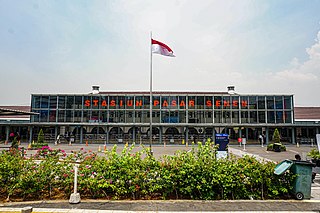
Pasar Senen Station (PSE) is a railway station located in Jakarta, Indonesia. It is the second largest railway station in Jakarta after Gambir Station. It is located close to Pasar Senen market area in Senen, Senen, Central Jakarta. The current building was built in 1918 and inaugurated on 19 March 1925.
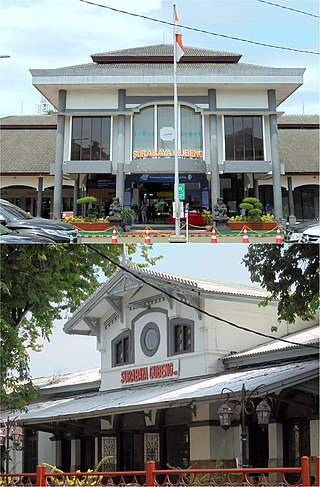
Surabaya Gubeng Station, known as Spoorwegstation Goebeng Soerabaja during the Dutch East Indies era, is a railway station located at Gubeng Station Street, Pacarkeling, Tambaksari, Surabaya, East Java, Indonesia. This station is the biggest railway station in Surabaya and East Java, and is a departure from the main railway in Surabaya, especially towards the south and east, while the train that passes through the northern route, such as majors train Jakarta via Semarang, departed from Surabaya Pasar Turi Station.

Surabaya Pasar Turi Station or Surabaya Pasarturi Station (SBI) is the second largest railway station in Surabaya, East Java. It is located near the Pasar Turi market in Bubutan, Surabaya. It is the main departure point of all train from Surabaya which passes through Pantura to the western cities of Java such as Jakarta and Semarang, but trains south and east line from Surabaya departed from Surabaya Gubeng. Since 2014, the station has upgraded railway signal and railroad switch devices from mechanical to electrical type produced by Len Industri.

Malang Station is a railway station in Malang City, East Java. The station is located at an altitude of approximately +444 meters amsl. It is the largest train station in Malang City. The existing building of Malang station was built in 1941 based on the work of J. van der Eb. The station is sometimes referred to as Malang Kotabaru Station to distinguish it from the original 1879 building of Malang station.

Cirebon Station also known as Cirebon Kejaksan Station is the main railway station in the Cirebon area located on Siliwangi Street, Kebonbaru, Kejaksan, Cirebon City, West Java Province. The station is located at DAOP 3 area as North Cross Line, but in this station there is also cross line in Purwokerto Station which is connected by South Cross Line in Kroya Station. Therefore, most of the trains both north and south lines stopped at this station, except economy class train which is stop at Cirebon Prujakan.

Surabaya Kota Station (SB) is a railway station in Bongkaran, Pabean Cantikan, Surabaya, East Java, Indonesia. The local people usually call it Semut Station.

Wonokromo Station (WO) is a large class type C railway station in Jagir, Wonokromo, Surabaya, East Java, operated by Kereta Api Indonesia. The station is located about 5 kilometers (3 mi) south of Surabaya Gubeng Station. It is close to the railway junction with each directions to Surabaya Gubeng station, Sidoarjo, and Madiun.
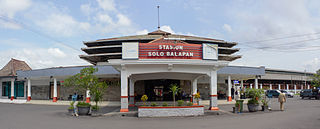
Solo Balapan Station is a major railway station in Surakarta, Central Java, Indonesia. The name "Balapan" is taken from the name of a village which is located to the north of the station. The station is located on the railway line that connects the cities of Bandung, Jakarta, Surabaya, and Semarang. Solo Balapan Station is the largest station in Surakarta and Central Java.

Madiun Station is a type-A major railway station in Madiun Lor, Mangunharjo, Madiun. This railway station located in Jalan Kompol Sunaryo 6A at an altitude of +63 m above sea level.
The Jakarta Kota–Manggarai railway, nicknamed the rainbow line, is an elevated, 15 km long railway line that connects Jakarta Kota with Manggarai. Given its central position in the city, it is one of the most important railways in Jakarta.
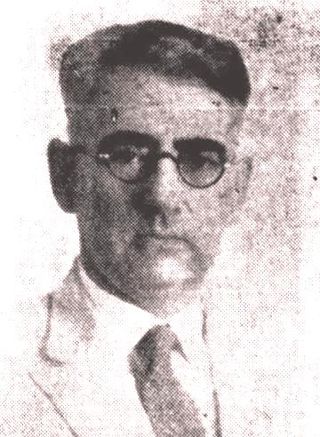
Cosman Citroen was a Dutch architect. He designed buildings in the Dutch East Indies including the headquarters of the Dutch East Indies Railway Company.

Ngawi Station is a first-class railway station in Gelung, Paron, Ngawi Regency, Indonesia, operated by Kereta Api Indonesia. This railway station located 8–10 km southwest from Ngawi (city). The new building is operated—which has four tracks —since Geneng–Kedungbanteng double track segment activation on 30 November 2019. Moreover, this former railway station name, Paron, has been changed.
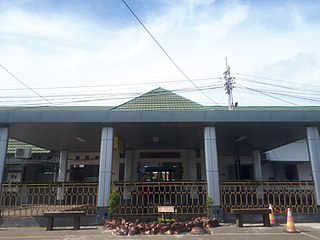
Kroya Station (KYA) is a railway station located in Bajing, Kroya, Cilacap Regency, Central Java, Indonesia. The station has nine railway tracks. It is a major junction station where the line from Yogyakarta split, where one goes to Purwokerto and Cirebon, while other head to Bandung.

Cipeundeuy Station (CPD) is a class II railway station located in Cikarag, Malangbong, Garut Regency. The station, which is located at an altitude of +772 meters, is included in the Operational Area II Bandung. This station has three railway tracks.
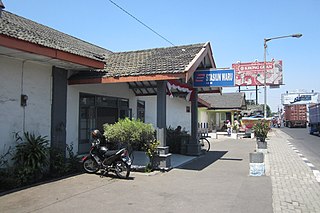
Waru Station (WR) is a class II railway station located in Kedungrejo, Waru, Sidoarjo Regency, East Java, Indonesia included in the Operation Area VIII Surabaya at an altitude of +5 meters (16 ft). The station is strategically located on the Surabaya–Sidoarjo main route and close to Purabaya Bus Terminal.

Gedangan Station (GDG) is a class III railway station located in Gedangan, Gedangan, Sidoarjo Regency, included in Operation Area VIII Surabaya at an altitude of +4 meters.
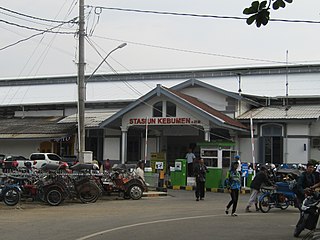
Kebumen Station (KM) is a large class type C railway station located in Panjer, Kebumen, Kebumen Regency, the railway station is included in the Operational Area V Purwokerto and is located at an altitude of +21 meters. As the main station in Kebumen Regency and located near the administrative center of Kebumen Regency, most trains passing on the southern route of Java stop at this station.

Purwosari Station (PWS) is a large class type C railway station located in Purwosari, Laweyan, Surakarta, Central Java, Indonesia. The station which is located at an altitude of +98 m is included in the Operational Area VI Yogyakarta and only serves economy class trains across south and local or commuter.












































